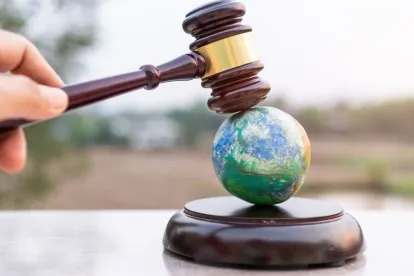The Brazilian government continues to fulfill its early commitment to combat the climate crisis, end deforestation, promote sustainable development, and enable energy transition, maintaining the trend reported in our two news alerts from November 2022 and January 2023. In the past 30 days, top leaders from Brazil and the U.S. met three times in São Paulo, Brasilia, and Washington D.C., to align on these subjects. In this alert, we will cover: how these meetings went; the next steps for both countries; and important regulatory advances and initiatives of Brazilian federal and state agencies concerning emerging contaminants, ozone-depleting substances’ wastes, and the oil & gas and telecommunications sectors.
The Brazilian Minister of Environment and Climate Change (Ministério do Meio Ambiente e Mudança do Clima - MMA), Ms. Marina Silva, hosted, in Brasilia, on February 28, 2023, the United States Special Presidential Envoy for Climate, Mr. John Kerry, concluding a series of work meetings held in the Brazilian Capital on February 26 and 27. During the dialogue, Minister Silva and Secretary Kerry pledged to reconvene the U.S.-Brazil Climate Change Working Group, established in 2015, and discuss areas of cooperation such as fighting deforestation and degradation, bolstering clean energy deployment, strengthening adaptation, and promoting low-emission agriculture practices. Kerry and Silva also agreed to work together under the United Nations Framework Convention on Climate Change, the Paris Agreement, the Kigali Amendment to the Montreal Protocol, and through initiatives such as the Global Methane Pledge. Secretary Kerry reiterated the U.S. intent to support the Amazon Fund as a component of the bilateral partnership and to mobilize additional support from the international community for this important initiative. Marina Silva, in turn, addressed the results and recommendations of the first meeting of the Steering Committee of the Amazon Fund (Comitê Orientador do Fundo Amazônia - COFA), as well as priorities and strategies of the Brazilian government to act in preventing and combating deforestation, promote sustainable development in the Amazon region, including urgent support for indigenous populations and the fight against illegal mining activities. John Kerry stated he would return to Brazil in the coming months and accepted an invitation from Marina Silva to visit the Amazon region.
The meetings in Brazil followed Brazil’s President Luiz Inácio Lula da Silva’s first official visit with President Biden at the White House in Washington, D.C., on February 10, 2023. President Biden announced his intent to work with the U.S. Congress to provide funds to protect and conserve the Brazilian Amazon, including initial support for the Amazon Fund. Find the White House’s Join Statement following Biden and Lula’s meeting here.
On February 16, 2023, the Consul General of the United States in São Paulo, David Hodge, accompanied by the Consul for Economic Affairs, Darryl Turner, visited the newly elected CEO of the São Paulo State environmental agency (Companhia Ambiental do Estado de São Paulo CETESB), the environmental attorney and biologist, Mr. Thomaz Toledo. Hodge took the opportunity to reaffirm the commitment of the U.S. Environmental Protection Agency (EPA) to the São Paulo Environmental Agency (CETESB), a long-standing commitment since the end of the 1980s. Thomaz recalled that while São Paulo is the wealthiest state in the Brazilian nation, it continues to face very sensitive environmental problems, where the support from EPA to CETESB was of fundamental importance. In turn, Dodge showed interest in understanding CETESB’s and the new government’s priorities in relation to the environment. In the end, both reaffirmed the continuity of the mutual collaboration relating to the environment between the U.S. and São Paulo governments.
Other Relevant Updates
-
The Brazilian Institute for the Environment and Renewable Natural Resources (Instituto Brasileiro do Meio Ambiente e dos Recursos Naturais Renováveis - IBAMA), in partnership with the Ministry of the Environment and Climate Change and CETESB, launched, on January 29, 2023, the “Orientation Guide for the Management and Environmentally Adequate Final Destination of Ozone-depleting substances (ODS) Wastes”, as part of the partnership between the Brazilian Government and the United Nations Development Programme (UNDP), under the “Demonstrative Project of Management and Final Disposal of ODS Waste”, approved by the Multilateral Fund for the Implementation of the Montreal Protocol. The Guide offers information on proper procedures and processes for the handling and final disposal of ODS wastes. Responsible disposal of these gases is necessary to prevent them from being released into the atmosphere again.
-
The National Agency of Petroleum, Natural Gas and Biofuels (Agência Nacional do Petróleo, Gás Natural e Biocombustíveis - ANP) announced in the Official Gazette of March 3, 2023, a public hearing, preceded by a 45-day public consultation, on the draft resolution that unifies the procedures for bidding on exploration areas and production of oil and natural gas under concession and production sharing regimes. Public Consultation Period: 45 days (from March 3 to April 17, 2023). The Public Hearing will take place on April 25, 2023. To participate in both and for more information about the process, please see here.
-
The National Telecommunications Agency (Agência Nacional de Telecomunicações - ANATEL) will hold two workshops this month to present and discuss its priorities with the private sector under the agency’s “2023-2027 Strategic Plan” and “2023-2024 Tactical Plan”, including new regulatory and technological tools for the use of the radio frequency spectrum, the revision of the Plan for Assignment, Allocation and Distribution of Frequency Bands in Brazil, and the definition of the criteria for the certification and approval of telecommunications products, in accordance with the best practices and international guidelines. The workshops will be held remotely.
-
The first workshop will be held on March 10, starting at 9 a.m., and will address three topics:
-
Prevention, mitigation, and fight against fraud in the digital ecosystem;
-
Digital Literacy, and
-
Support, articulation, and cooperation for the development of new technologies.
-
The second workshop is scheduled for March 17, also starting at 9 a.m., and will discuss the following topics:
-
Promoting quality and transparency in the fixed band offer;
-
Improved infrastructure quality and capacity; and
-
Modernization of inspection mechanisms.
-
CETESB and the New Persistent Organic Pollutants (POPs): Per- and Polyfluorinated Alkyl Substances (PFAS), Polybrominated diphenyl ethers (PBDEs), and Polybrominated biphenyls (PBBs): CETESB hosted, on February 27 and 28, the seminar “Support for the Global Monitoring Plan (GMP) of Persistent Organic Pollutants (POPs) of the Stockholm Convention – Phase 2” where it presented the results of POPs monitoring in Brazil, with emphasis on PFAS, PBDEs, and PBBs. Find full recordings of the first day of the event here and the second day here. Brazil has not yet updated its potability standards, and CETESB has not yet published new guiding values for soil and groundwater in order to include PFAS. However, the São Paulo State agency declared its commitment to advance, in 2023, the country’s emerging contaminants regulatory framework and enforcement actions by implementing a method for the detection of PFAS compounds in water and monitoring the State of São Paulo’s waters for PFAS present in 4,700 industrial chemical products. All monitoring data on emerging contaminants (estrogens, anti-inflammatories, and in the future, PFAS) are available at the CETESB's portal. To date, in relation to PFAS, CETESB has (i) published a 2021 non-binding Toxicological Information Sheet, which references the 2016 U.S Environmental Protection Agency (EPA) lifetime drinking water health advisories levels for PFAS, updated in 2022, and (ii) issued, on December 20, 2022, the Version 3.02 of its Risk Assessment Worksheets for Contaminated Areas under Investigation, in accordance with EPA’s November 2022 toxicological and physicochemical “Regional Screening Levels – RSLs,” which includes PFAS.





 />i
/>i
